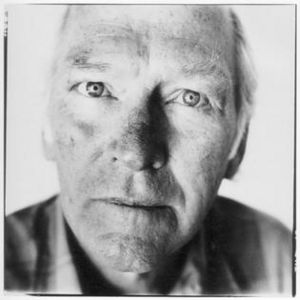Donald Davidson (philosopher) facts for kids
Quick facts for kids
Donald Davidson
|
|
|---|---|

Portrait by photographer Steve Pyke in 1990.
|
|
| Born |
Donald Herbert Davidson
6 March 1917 |
| Died | 30 August 2003 (aged 86) |
| Education | Harvard University (AB, 1939; PhD, 1949) |
| Era | 20th-century philosophy |
| Region | Western philosophy |
| School | Analytic Neopragmatism |
| Thesis | Plato's 'Philebus' (1949) |
| Doctoral advisor | Raphael Demos Donald Cary Williams |
| Other academic advisors | Willard Van Orman Quine |
| Doctoral students | Daniel Bennett Akeel Bilgrami Michael Bratman Anthony Dardis Noa Latham Ariela Lazar Kirk Ludwig Robert Myers Dugald Owen Carol Rovane Claudine Verheggen Stephen Yablo |
|
Main interests
|
Philosophy of language, philosophy of action, philosophy of mind, epistemology, ontology |
|
Notable ideas
|
Radical interpretation, anomalous monism, truth-conditional semantics, principle of charity, slingshot argument, reasons as causes, understanding as translation, swampman, events, Davidson's translation argument against alternative conceptual schemes (the third dogma of empiricism) |
|
Influenced
|
|
Donald Herbert Davidson (March 6, 1917 – August 30, 2003) was an important American philosopher. He taught at several famous universities, including the University of California, Berkeley. Davidson was known for his interesting ideas and how deeply he thought about things.
His work greatly influenced many areas of philosophy from the 1960s onwards. He was especially known for his ideas in the philosophy of mind (how our minds work), philosophy of language (how language works), and action theory (why we do what we do). Even though he was an analytic philosopher, his ideas also caught the attention of those in continental philosophy.
Contents
About Donald Davidson's Life
Donald Davidson was married three times during his life. His first wife was an artist named Virginia Davidson. They had one daughter together, Elizabeth.
After his first marriage ended, he married Nancy Hirschberg. She was a Professor of Psychology. Sadly, Nancy passed away in 1979. In 1984, Davidson married for the third time to another philosopher, Marcia Cavell.
The Swampman Thought Experiment
One of Donald Davidson's most famous ideas is called the "Swampman" thought experiment. A thought experiment is like a story or a puzzle used in philosophy to explore big ideas. Davidson introduced this idea in 1987.
What is the Swampman?
Imagine this: Donald Davidson is in a swamp and is struck by lightning. He disappears completely. At the exact same moment, by pure chance, a tree nearby is turned into an exact copy of Davidson. This copy is called the Swampman.
The Swampman looks exactly like Davidson. It acts just like Davidson would. It leaves the swamp, seems to recognize Davidson's friends, and even talks to them in English. It goes to Davidson's house and seems to write articles. No one can tell the difference between the real Davidson and the Swampman.
What the Swampman Teaches Us
Even though the Swampman is a perfect physical copy, Davidson argued there's a big difference. He said the Swampman doesn't truly have thoughts or understand language. Why? Because it doesn't have a past or a history.
For example, the Swampman can't recognize Davidson's friends because it never met them before. It can't remember Davidson's house. When it says the word 'house', it doesn't truly mean the same thing Davidson did. This is because the Swampman didn't learn the word 'house' through experiences like Davidson did.
Davidson used this experiment to suggest that our thoughts and the meaning of our words are connected to our experiences and how we interact with the world. They don't just exist on their own.
Awards and Recognition
- Jean Nicod Prize (1995)
Videos About Donald Davidson
- Rudolf Fara (host), In conversation: Donald Davidson (19 videocassettes), Philosophy International, Centre for Philosophy of the Natural and Social Sciences, London School of Economics, 1997.
See also
 In Spanish: Donald Davidson para niños
In Spanish: Donald Davidson para niños
 | Georgia Louise Harris Brown |
 | Julian Abele |
 | Norma Merrick Sklarek |
 | William Sidney Pittman |

